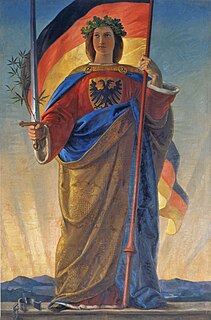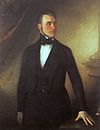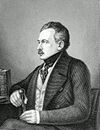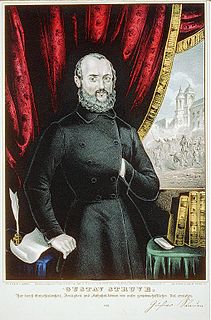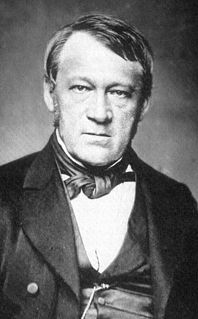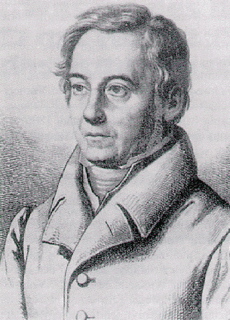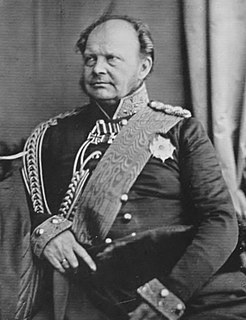
Frederick William IV, the eldest son and successor of Frederick William III of Prussia, reigned as King of Prussia from 1840 to 1861. Also referred to as the "romanticist on the throne", he is best remembered for the many buildings he had constructed in Berlin and Potsdam, as well as for the completion of the Gothic Cologne Cathedral. In politics, he was a conservative, and in 1849 rejected the title of Emperor of the Germans offered by the Frankfurt Parliament as not the Parliament's to give. In 1857, he suffered a stroke and was left incapacitated until his death. His brother Wilhelm served as regent for the rest of his reign and then succeeded him as King.

The German revolutions of 1848–49, the opening phase of which was also called the March Revolution, were initially part of the Revolutions of 1848 that broke out in many European countries. They were a series of loosely coordinated protests and rebellions in the states of the German Confederation, including the Austrian Empire. The revolutions, which stressed pan-Germanism, demonstrated popular discontent with the traditional, largely autocratic political structure of the thirty-nine independent states of the Confederation that inherited the German territory of the former Holy Roman Empire.

St Paul's Church is a Protestant church in Paulsplatz, Frankfurt am Main with important political symbolism in Germany. It is a parish of the Protestant Church in Hesse and Nassau, a United member church of the Evangelical Church in Germany. It is notable for being the seat of the 1848 Frankfurt Parliament, the first publicly and freely-elected German legislative body. Although now a United Protestant church, it was started as a Lutheran church in 1789—coincidentally the same year as the French Revolution.

For almost five centuries, the German city of Frankfurt was a city-state within two major Germanic entities:

Carl Friedrich Wilhelm Emich, Prince of Leiningen, KG, was the third Prince of Leiningen and maternal half-brother of Queen Victoria. Leiningen served as a Bavarian lieutenant general, before he briefly played an important role in German politics as the first Prime Minister of the Provisorische Zentralgewalt government formed by the Frankfurt Parliament in 1848.

The Casino faction was a moderate liberal faction within the Frankfurt Parliament formed on June 25, 1848. Like most of the factions in the parliament, its name was a reference to the usual meeting place of its members in Frankfurt am Main. Casino was the largest and most influential faction at Paulskirche. Its members were for the most part national liberals.
The Frankfurt Constitution or Constitution of St. Paul's Church (Paulskirchenverfassung), officially named the Constitution of the German Empire of 28 March 1849, was an unsuccessful attempt to create a unified German nation state in the successor states of the Holy Roman Empire organised in the German Confederation. Adopted and proclaimed by the Frankfurt Parliament after the Revolutions of 1848, the constitution contained a charter of fundamental rights and a democratic government in the form of a constitutional monarchy. King Frederick William IV of Prussia was designated head of state as "Emperor of the Germans", a role he rejected.

Friedrich Daniel Bassermann was a German liberal politician who is best known for calling for a pan-German Parliament at the Frankfurt Parliament. He emphasized the value of a national self-esteem based on progress and freedom.
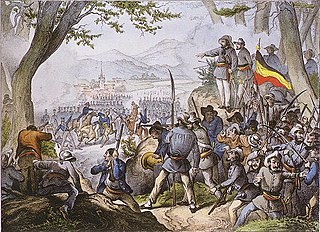
The Hecker uprising was an attempt by Baden revolutionary leaders Friedrich Hecker, Gustav von Struve, and several other radical democrats in April 1848 to overthrow the monarchy and establish a republic in the Grand Duchy of Baden. The main action of the uprising consisted of an armed civilian militia under the leadership of Friedrich Hecker moving from Konstanz in the direction of Karlsruhe with the intention of joining with another armed group under the leadership of Georg Herwegh there to topple the government. The two groups were halted independently by the troops of the German Confederation before they could combine forces. The Hecker Uprising was the first large uprising of the Baden Revolution and became, along with its leader, part of the national myth.
The Baden Revolution of 1848/1849 was a regional uprising in the Grand Duchy of Baden which was part of the revolutionary unrest that gripped almost all of Central Europe at that time.

The factions in the Frankfurt Assembly were the groups or political factions that developed among delegates to the Frankfurt Parliament that met from 18 May 1848 to 31 May 1849 in the Paulskirche in Frankfurt am Main. They coalesced as groups of like-minded representatives started meeting, and were named after the various hostelries at which they met. Eventually they formed larger groups or blocs based on similar political values.

The Grand Duchy of Baden was a state in the southwest German Empire on the east bank of the Rhine. It existed between 1806 and 1918.

The Palatine uprising was a rebellion that took place in May and June 1849 in the Rhenish Palatinate, then an exclave territory of the Kingdom of Bavaria. Related to uprisings across the Rhine River in Baden, it was part of the widespread Imperial Constitution Campaign (Reichsverfassungskampagne). Revolutionaries worked to defend the Constitution as well as to secede from the Kingdom of Bavaria.
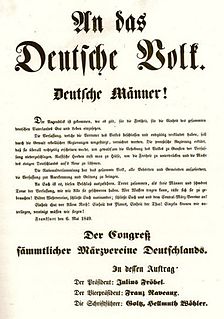
The Imperial Constitution campaign was an initiative driven by radical democratic politicians in Germany in the mid-19th century that developed into the civil warlike fighting in several German states known also as the May Uprisings (Maiaufstände). These conflicts against the counter-revolutionaries began in May 1849 and varied in length and intensity depending on the region. Some lasted until July that year. They marked the end phase of the popular and nationalist March Revolution that had started a good year before in March 1848.

The Battle on the Scheideck, also known as the Battle of Kandern took place on 20 April 1848 during the Baden Revolution on the Scheideck Pass southeast of Kandern in south Baden in what is now southwest Germany. Friedrich Hecker's Baden band of revolutionaries encountered troops of the German Confederation under the command of General Friedrich von Gagern. After several negotiations and some skirmishing a short battle ensued on the Scheideck, in which von Gagern fell and the rebels were scattered. The German Federal Army took up the pursuit and dispersed a second revolutionary force that same day under the leadership of Joseph Weißhaar. The Battle on the Scheideck was the end of the road for the two rebel forces. After the battle, there were disputes over the circumstances of von Gagern's death.

